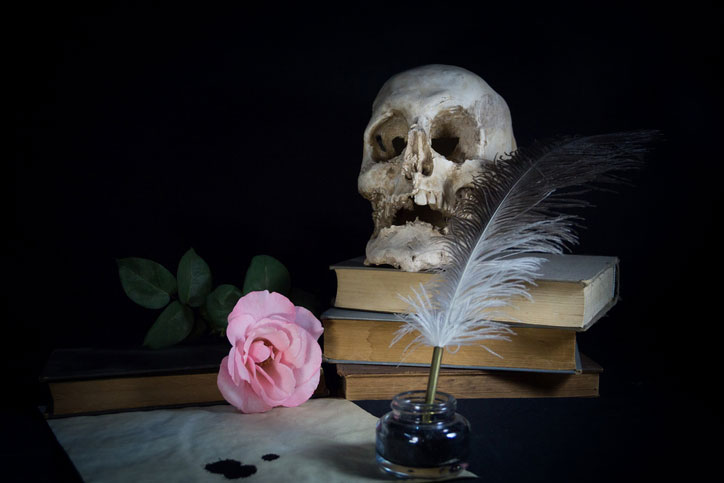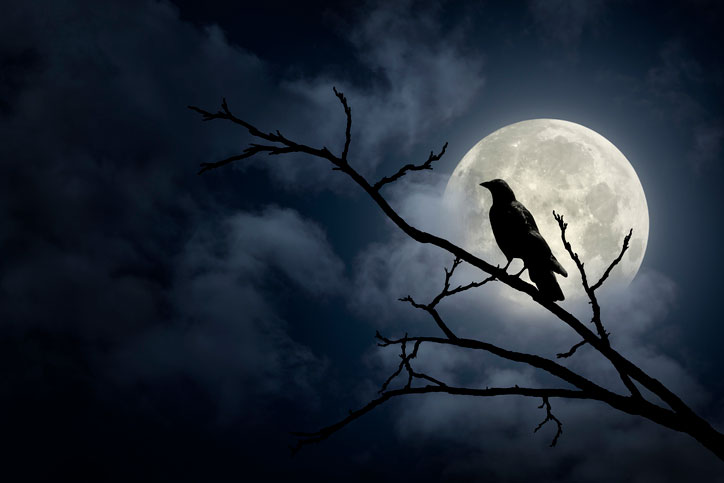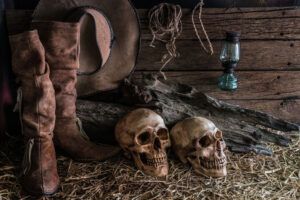Written by Scott Wilson

Shocking, frightening, captivating… good works of horror fiction are both disturbing and impossible to put down. The visions of the horrendous stick with readers well after the covers have been closed. Being walled up alive in catacombs with a cask of amontillado, giving birth to a demonic child, or becoming gripped by suicidal madness after spending time in a haunted house aren’t things that can really happen to most of us. But the magic of horror is that it engages the imagination so that we believe they may.
Horror plays upon our fears to spark some deep, primeval emotions.
Most people suspect there must be something just a little bit wrong with horror writers for them to deliver such macabre visions. But horror is an ancient genre, stretching back to the fairytales told around fires long before the written word became a thing.
Despite my ghoulish reputation, I really have the heart of a small boy. I keep it in a jar on my desk.
~ Robert Bloch
Horror fiction is commonly crossed with other genres:
Fantasy and Science Fiction
Mary Shelley’s Frankenstein grew out of a competition between her, her husband Percy, and Lord Byron to see who could write the best horror story. The scientific elements of the novel place it among the first works of science fiction… and among the most frightening.
Mystery
The Silence of the Lambs is the story of the FBI hunting for a serial killer… using another serial killer, with horrific tendencies in cuisine. Thomas Harris won both the Anthony Award for detective fiction and the Bram Stoker award for horror writing in one swoop.
Poetry
One of the best known of all American poems owes its popularity to its dreary, depressing atmosphere. Poe’s The Raven is a classic that rhymes as it affrights readers even today.

Comedy
When you put a newly minted vampire together with a crew of Safeway night stockers and turkey bowlers you get Christopher Moore’s Bloodsucking Fiends, a fiendishly funny take on tropes in horror handed down since Dracula… with a side dish of fear served up along the way.
Because of horror’s long-lasting appeal, it’s both in-demand and lucrative. You need look no further than the careers of Stephen King, Dean Koontz, or Anne Rice to see that having a taste for blood can lead to a taste of success.
Horror writers don’t just write novels and short stories. The genre is also popular in film and television, making scriptwriting a popular path for many horror writers.
More than many genres, horror relies on a formula. Successful horror writers must be able to develop characters the reader can empathize with, craft plots that develop genuine fear, and set a tone that evokes dread. It’s a craft that requires an education. And creative writing degrees offer exactly the kind of training that horror writers need.
What Makes Horror So Compelling for Both Readers and Writers?
The oldest and strongest emotion of mankind is fear, and the oldest and strongest kind of fear is fear of the unknown.
~ H.P. Lovecraft
Maybe it’s better not to delve too deeply into the world of id and imagination that seem to compel such fascination with the dark and sinister.
 But horror writers must be able to tap into that nameless psychological itch in order to develop imaginative, titillating, unforgettable tales that will keep their readers up well past their bedtimes.
But horror writers must be able to tap into that nameless psychological itch in order to develop imaginative, titillating, unforgettable tales that will keep their readers up well past their bedtimes.
There has been plenty of psychological investigation into why exactly it is that a large percentage of readers seem to enjoy having the pants scared off them.
What psychologists have found is that works of horror stimulate the ancient fight-or-flight response. The feeling of relief the brain experiences when that response is released, by the resolution of the frightening scene of the end of the work, results in a flood of endorphins, the body’s built-in pain relief and stress reducing chemical.
Some people seem to have a greater affinity for horror than others, but fictional works of horror seem to serve as a kind of escapism for many readers. As strange as it may sound to want to dive into bleak and frightening worlds in place of the relatively benign reality we enjoy, it’s an appeal that is hardwired into us.
That means good horror writers are never going to lack for an audience.
Horror Writing Is One of the Most Popular Niches in Creative Writing
You’d be hard-pressed to find any consecutive versions of the weekly New York Times’ Fiction Best Sellers list that don’t have a horror novel or two somewhere on them. Horror novels have been a commercial sensation going back to the very earliest days of the genre.
The Strange Case of Dr. Jekyll and Mr. Hyde, by Robert Louis Stevenson, sold 40,000 copies in the first six months, and more than 250,000 copies in the United States alone within 15 years.
Jekyll and Hyde also is representative of the role that horror fills in the literary market. One of the so-called penny dreadfuls, it was published as a paperback and sold for a penny as sensational fodder for the mass-market.
Horror Can Deliver Social Commentary Along With Good Scares
 Horror has long been a genre for exploring the deepest fears of both individuals and society. Whether it’s the suggestion of transgressive sexuality woven through Dracula or the implicit critiques of consumerism in Dawn of the Dead, horror writers have used the form for political critique and exploration of cultural mores and standards.
Horror has long been a genre for exploring the deepest fears of both individuals and society. Whether it’s the suggestion of transgressive sexuality woven through Dracula or the implicit critiques of consumerism in Dawn of the Dead, horror writers have used the form for political critique and exploration of cultural mores and standards.
A new generation of Black authors and writers are taking to horror now to explore and illustrate some of the longstanding racial issues in America. They present a unique angle to what drives fear in different populations… in Jordan Peele’s Get Out, one of the most frightening moments is the approach of police sirens coming toward the Black protagonist at the end of the story.
The revealing play of social expectations and exploration of tropes of slavery through the dreadful prism of the Black experience is lending new relevance to horror as cultural commentary. And with Get Out, it also won writer Jordan Peele an Oscar for Best Original Screenplay.
While the mass-market appeal of horror remains, it’s also a genre that has produced works that endure. Jekyll and Hyde, Dracula, and classics by Poe and Lovecraft remain widely read even today. Writing in horror is a way for creative writers to pursue both a commercially successful career and find literary respect.
How Online Creative Writing Degrees Help Build Horror Writing Skills
 For most people, the scariest thing about a college degree is the price tag.
For most people, the scariest thing about a college degree is the price tag.
For future horror writers, though, a creative writing degree offers many of the tools they need to be successful.
Even if you have a knack for coming up with haunting or horrific scenarios to spin into stories, writing is a craft that takes practice on top of talent. Few people have the discipline or the dedication to get through the hard parts alone. Stephen King, one of the most celebrated of modern horror writers, focuses on the importance of strong English skills and editing in his advice to writers. King developed many of those skills himself through an English degree.
Creative writing degrees offer not only those essential mechanical skills in writing, but also a deeper exploration of the writer’s craft. They include a number of characteristics valuable not just in horror writing, but to any writer:
- Broad reading and writing assignments for experience in multiple styles and genres
- Classes in technical skills such as character and world-building
- Networking within the literary community and developing a general understanding of the business of publishing
On top of those features, though, creative writing degrees come with elements that are particularly useful in horror writing.
A Deep Understanding of Human Psychology
We make up horrors to help us cope with the real ones.
~ Stephen King
Writing good horror relies on a strong understanding on human psychology. Although psychology coursework isn’t an integral part of creative writing studies, most undergraduate college programs have required classes in psychology and the opportunity to explore it even further. Those are studies that horror writers can put to good use in developing plots that shock.
When Horror Writing Becomes High Art
 Cormac McCarthy’s Blood Meridian has been called “The Great American Novel” but it’s also a horrific exploration of man’s basest instincts and the supernatural as a commentary on war and manifest destiny. Sitting astride the genres of horror, supernatural fantasy, and the Western as easily as the Judge bestrides his horse, Blood Meridian defies easy categorization or interpretation.
Cormac McCarthy’s Blood Meridian has been called “The Great American Novel” but it’s also a horrific exploration of man’s basest instincts and the supernatural as a commentary on war and manifest destiny. Sitting astride the genres of horror, supernatural fantasy, and the Western as easily as the Judge bestrides his horse, Blood Meridian defies easy categorization or interpretation.
The effect on readers is as shocking as that of any horror story, however. The relentless atrocities, senseless violence, and moral vacancy of the characters is accentuated by the basis in real events. It’s magnified by the pontification of the Judge, a relentless and evil force cloaked in manners and learning.
The novel continues to resonate in the canon of several different genres, but horror writers recognize McCarthy as one of their own. And the critical acclaim for Blood Meridian offers a path to literary respect and excellence that is open to any writer of horror.
Plotting for the Right Level of Suspense
 Creative writing programs also offer extensive training in the science and execution of plotting itself. Most works of horror are plot-driven. Not only that, but they require a very specific kind of pacing and development in order to elevate the levels of suspense needed to build fear in the reader.
Creative writing programs also offer extensive training in the science and execution of plotting itself. Most works of horror are plot-driven. Not only that, but they require a very specific kind of pacing and development in order to elevate the levels of suspense needed to build fear in the reader.
Although horror does not necessarily overlap with the genre of suspense and thrillers, it still has to walk a similar tightrope to cultivate the right level of terror and relief necessary in a horror story.
Style and Storytelling Skills To Describe the Indescribable
The basis of all true cosmic horror is violation of the order of nature, and the profoundest violations are always the least concrete and describable.
~ H.P. Lovecraft
Horror writers almost universally face the challenge of describing their awful inventions in enough detail to provoke the imagination but without so much to make it banal. Horror is also among the most visual of genres, painting pictures so vivid that they seem real.
That takes exceptional writing skills. Creative writing programs develop your mastery of essential techniques for setting a tone of fear and dread. You’ll learn how to better use language to hook readers into the most frightening or disgusting scenarios.
Feedback and Fine Tuning for Tone and Storytelling
It’s hard for the average writer to understand fully how their work will land with readers. This can be a particular challenge with horror; different things are scary to different people in different ways. So getting a wide range of feedback on your writing is valuable to understand how to aim it at the audience you want to reach.
By taking a creative writing program, your work will end up in front of not just experienced instructors, but also be read and reviewed by your classmates. Fine-tuning the tone and voice in your peace to hit the terror button in all your readers takes time and revision. You’ll get the support you need on both points in a creative writing program.
While few creative writing degrees offer explicit concentrations or specializations in horror, they do come with a broad perspective on the different kinds of writing that can become great literature.
Online Creative Writing Degrees Can Make School Less Scary for Horror Writers
 Through the modern miracle of the internet, you can get all those skills and more without venturing out of your own bedroom. Creative writing degrees have always been a more solitary pursuit than most kinds of college programs. Although some of the most valuable parts of them come through interaction with professors and your fellow students, the bulk of the work happens individually.
Through the modern miracle of the internet, you can get all those skills and more without venturing out of your own bedroom. Creative writing degrees have always been a more solitary pursuit than most kinds of college programs. Although some of the most valuable parts of them come through interaction with professors and your fellow students, the bulk of the work happens individually.
Whether you are plowing through long reading lists or working on the 351st draft of your final project, you’re going to be doing it by yourself whether on campus or off.
Online creative writing degrees offer you a much wider selection of different schools and programs than if you could only look closer to home. With a niche genre like horror, it can be important to find a school that has a good fit for your style. Remote studies increase those odds.
In many cases, online programs still come with some limited in-person study, usually in the form of occasional workshops or brief off-campus residencies. This can be the best of both worlds, particularly for horror writers—watching the faces of fellow students can tell you volumes about how your work is hitting.
Finding the Right Degree Level for Your Horror Writing Career
Creative writing is taught at five different levels in the college system in the United States:
- Certificate programs offer a focused approach to creative writing training that make take only a few weeks or months but zero in on specific genre or craft instruction
- Associate degrees take two years and split their coursework between general studies and basic writing skills in composition and grammar.
- Bachelor’s degrees offer four years of training in both general knowledge and liberal arts as well as reading, English, and writing topics.
- Master’s degrees are two-to-three year courses of study that focus on polishing your writing skills and preparing you and your works for professional publication.
- Doctoral degrees are five to seven year programs of study that are primarily designed to prepare graduates for teaching creative writing at the university level.
The right choice for you as a prospective horror writer will depend on factors such as:
- Your finances
- The amount of time you have to pursue a degree
- Your current skill level as a writer
The range of different educational programs in creative writing, as well as the breadth of styles and concentrations available through them, means that you can always find a good fit for whatever combination of those factors you have going on in your life:
- A high school graduate who hopes to follow in Stephen King’s footsteps may opt for an associate’s or bachelor’s degree to get started.
- A forensic pathologist with some juicy stories and a medical degree behind them might opt for a certificate to get a laser focus on getting their thoughts on paper.
- A writer who has been freelancing or working in other genres might decide to up their game through a Master of Fine Arts (MFA) in Creative Writing, honing their skills to the highest levels in search of success.
You’ll have to pack your own vivid and horrific imaginings, but a degree in creative writing can give you all the other elements you need to become a successful horror writer.




